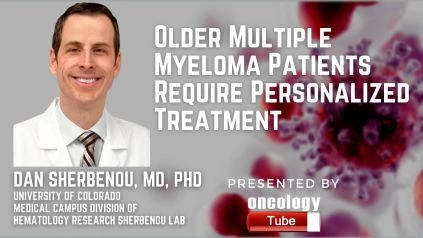Dan Sherbenou, MD, Ph.D. from the University of Colorado Medical Campus, Division of Hematology Research, Sherbenou Lab speaks about Older Multiple Myeloma Patients Require Personalized Treatment.
Link to Press Release:
https://www.waxmancancer.org/about-us/newsroom/press-releases/method-developed-to-treat-multiple-myeloma-patients/
Although MM remains an incurable condition, improvements in drug therapies have increased the quality of life over the past 20 years. Older patients, on the other hand, have a lower tolerance for the side effects of the standard three-drug regimen, which is typically given in monthly or annual infusion appointments. As a result, older patients are often undertreated, receiving two-drug regimens with a lower chance of a positive reaction.
Dr. Daniel Sherbenou and colleagues at the University of Colorado Division of Hematology developed Myeloma Drug Sensitivity Testing, or My-DST, a method to test multiple drugs against an individual’s myeloma in cell culture to determine which medications will be most effective, thus avoiding those that would have little to no detectable efficacy, thus providing a path to cure.
They show in their recent analysis that My-DST will reliably assess the medications that are best for each individual’s malignancy, implying that adopting this strategy will improve outcomes. Since most elderly patients cannot handle the three-drug regimen, patients can have safer results while avoiding the toxicities associated with different drug combinations if only effective medications are used.
MM accounts for around 10% of all hematologic tumors in the United States. The estimated age of onset is 70 years, and patients aged 75 and over account for 37% of newly diagnosed cases. In the United States, more than 35,000 new patients are diagnosed each year, a figure that has gradually increased in tandem with an aging population.

